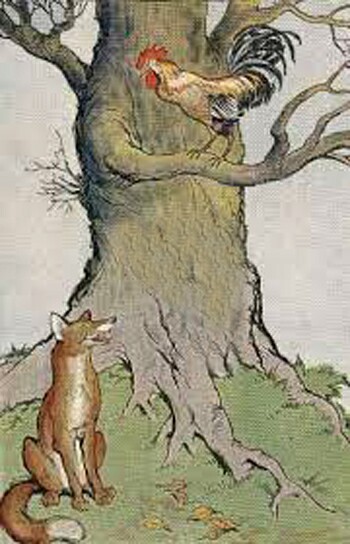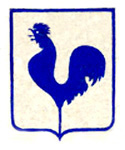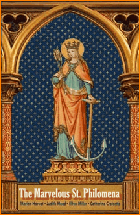Stories & Legends
 |
 |
 |
 |
 |
 |
 |
The Cock and the Wolf
What follows is one of two indisputably Carolingian beast fables written in the 8th century by Alcuin, the English scholar and churchman whom Charlemagne charged with superintending the educational revival in his Kingdom.
Throughout the fable, Alcuin tells us of an exemplary cock which sinned against humility, repented of his pride and thus shrewdly escaped the infernal wolf's clutches.
Throughout the fable, Alcuin tells us of an exemplary cock which sinned against humility, repented of his pride and thus shrewdly escaped the infernal wolf's clutches.
There is a bird called by the special surname "cock." This bird announces the daybreak, dispels the shadows from the earth, marks the times of the day, and is girded in his loins. The flock of chickens is ruled subject to his authority. God praises the cock by saying that he has understanding (1): To be sure, he reveals the times of the day from beneath an obscure cloak.
O, what a sorrow! One day the cock was hastening too far from home, testing for food with his beak. As he sought food by himself and ranged over the cross roads, boasting of his courage and prowess – Alas! – too bold and very proud, he was snatched by the lurking wolf.

The cock makes his escape from the trickery of the wolf
"I do not grieve so much to be devoured by a hated mouth as to be cheated of being allowed to hear from you what was possible to believe about your voice."
The beast believed what the cock said, and the wolf, swollen with love of the praise that had been offered, opened his hellish throat, spread wide his gluttonous jaws, and unlocked the innermost chamber of that vast cavern and howled with all his might.
And so swiftly the cock, harbinger of daybreak, escaped the jaws of the vain wolf and, with a single bound, flew up swiftly and clung to a tree branch.
As soon as he had gained this sudden freedom, the bird sitting on high branch, brought forth songs with these words: "Whoever grows proud without reason is deservedly deceived, and whoever is taken in by false praise will go without food, so long as he tries to spread about empty words before eating."
This fable applies to those people, whoever they are, who have obtained salvation rightly, but are then deprived of it by black deceits in paying heed to false breezes with their empty rumors.
- Job 38.36, Quis posuit in visceribus hominis sapientiam? vel quis dedit gallointellegentiam? (Who hath put wisdom in the heart of man? or who gave the cock understanding?)
Adapted from Jan M. Ziolkowski, Talking Animals: Medieval Latin Beast Poetry, 750-1150,
University of Pennsylvania Press, 1993,p. 241
Posted April 11, 2015
University of Pennsylvania Press, 1993,p. 241
Posted April 11, 2015







